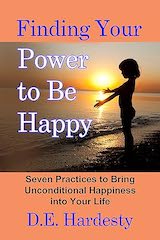
|
FreeComputerBooks.com
Links to Free Computer, Mathematics, Technical Books all over the World
|
|
- Title Finding Your Power to Be Happy: Seven Practices to Bring Unconditional Happiness into Your Life
- Author(s) D.E. Hardesty
- Publisher: CreateSpace (January 5, 2015); eBook (Smashwords, Mar 19, 2015)
- Hardcover: 324 pages
- eBook: PDF, ePub, Mobi, etc.
- Language: English
- ISBN-10/ASIN: 1505790905
- ISBN-13: 978-1505790900/978-1311878144
- Share This:

|
How Can I Be Happy? How Can I Find Joy? How Can I Find Happiness that Lasts? This book answers these questions, and many more. This book is about learning to be happy. The good news is: everyone has the natural power to be happy, right now! Everyone wants to be happy and wants that happiness to last. This book teaches unconditional happiness. The nature of unconditional happiness is that it is lasting. In addition, you do not have to do anything to get it. It is natural, and it is already inside of you, waiting to be released.
About the Authors- D.E. Hardesty, has been studying spirituality for over forty years. He started writing about happiness in response to his daughter's questions about what to do in life.

- Finding Your Power to Be Happy: Seven Practices to Bring Unconditional Happiness into Your Life
- The Mirror Site (1) - PDF
-
 How to Do What You Love and Earn What You are Worth
How to Do What You Love and Earn What You are Worth
Choosing where to work, what to work on, and with whom to work isn’t just the most important question, in some ways it’s the only question. Here are a few of essays touching on that topic from over the years.
-
 Mind Hacking: How to Change Your Mind for Good in 21 Days
Mind Hacking: How to Change Your Mind for Good in 21 Days
Teaches you how to reprogram your thinking - like reprogramming a computer - to give you increased mental efficiency and happiness. Learn to take charge of your mind and banish negative thoughts, habits, and anxiety - in just 21 days!
-
 Mind Relief Manuscript (Jerry Stocking)
Mind Relief Manuscript (Jerry Stocking)
In this book, the author's simple tricks and exercises that will allow you to quiet your mind, reduce stress and think clearly. You will access mental flexibility and deep inner peace while reading through this fast fun book, guaranteed to lighten your day!
-
 Mind, Body, World: The Foundations of Cognitive Science
Mind, Body, World: The Foundations of Cognitive Science
Introduce the foundations of cognitive science, this book addresses a number of questions currently being asked by those practicing in the field of cognitive science. It highlights the fundamental tensions and lines of fragmentation of cognitive science.
-
 Paths: Why is Life Filled with so many Detours?
Paths: Why is Life Filled with so many Detours?
This book explores the amazing similarity between paths taken by people and many other things in life, and its impact on the way we live, teach and learn. Offering insights into the new scientific field of paths as part of the science of networks, etc.
-
 Train Your Brain: Build a Framework for Clear Thinking
Train Your Brain: Build a Framework for Clear Thinking
This book will help you build a mental framework for clear thinking. With daily practice you can build your skills in clear thinking, and become a more productive and happier person. The basic anatomy of the brain is presented.
-
 What is and What will be: Integrating Spirituality and Science
What is and What will be: Integrating Spirituality and Science
This book integrates science with values and meaning by making the simplest possible assumption about the connection between physical structure and conscious experience. This follows from Gödel's Incompleteness Theorem and the assumptions of this book.
-
 Motivation: How To Enjoy It Every Day (David Valois)
Motivation: How To Enjoy It Every Day (David Valois)
21 Secrets To Get Motivated - Even If You Are In The Most Difficult Situation! Do you want to know what do high motivated achievers that others don't? Then you need MOTIVATION. And here you will discover how.
-
 Why Knowing What To Do Is Not Enough?
Why Knowing What To Do Is Not Enough?
It explains the reasons for the gap between 'knowing' and 'doing', focuses on the role of non-cognitive capacities, such as setting goals, taking action, persevering and coping with setbacks, and shows how these capacities are undermined by adverse circumstances.
-
 Learning from Arguments: An Introduction to Philosophy
Learning from Arguments: An Introduction to Philosophy
The aim is to introduce newcomers to the dynamics of philosophical argumentation, using some of the arguments standardly covered in an introductory philosophy course, but without the additional hurdles one encounters.





